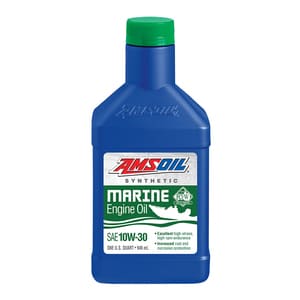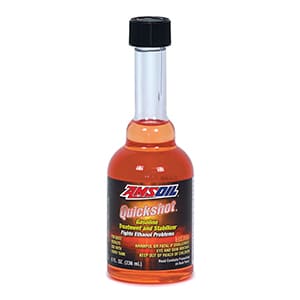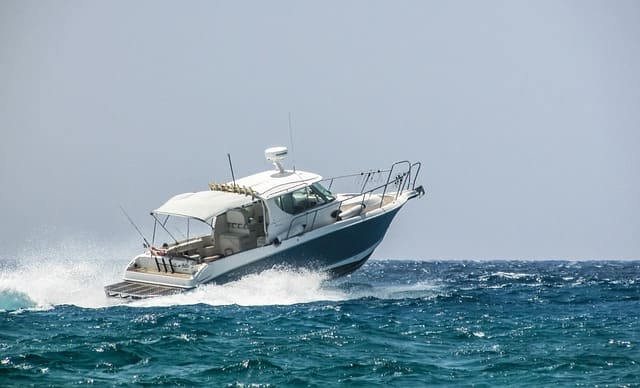Picture this: You’re out on the water, enjoying a perfect day on your boat, when suddenly your engine sputters. One key reason for such unexpected failures is bad motor oil. Yes, boat motor oil can go bad, primarily due to oxidation. Oxygen, while essential for life, accelerates the degradation of lubricants, making them thick and sludge-ridden.
Marine engines face harsh conditions like no other. High temperatures and constant moisture put extra stress on the oil, leading to faster oxidation. This results in thicker oil, sludge, and decreased engine efficiency. Conventional oils struggle in these conditions, but synthetic marine engine oils are designed to hold up better.
Synthetic oils resist oxidation more effectively due to their uniform molecular structures and lack of impurities. They also contain high-quality antioxidants that prevent the formation of sludge, extending the life of your engine. So, if you’re serious about maintaining your boat’s engine health, switching to synthetic marine engine oil is a no-brainer.

Understanding Boat Motor Oil
When it comes to keeping your boat in top condition, understanding motor oil is key. Let’s explore the crucial role motor oil plays and the different types available for marine engines.
The Role of Motor Oil
Motor oil does more than you might think. It lubricates, cleans, and protects the engine components. Imagine the engine parts, working together like a well-oiled machine. When everything runs smoothly, your boat’s engine has a longer life and better performance.
Lubrication:
Just like a bicycle chain needs oil to move without squeaking, your boat engine needs motor oil. It reduces the friction between moving parts, preventing wear and tear.
Cleaning:
You might not realize it, but motor oil helps keep the engine clean. It picks up dirt and other particles and carries them to the oil filter. Without this cleaning action, the engine would get clogged and stop working efficiently.
Protection:
Motor oil also protects the engine from rust and corrosion. By creating a barrier between the metal parts and the air and water, it keeps the engine safe from damage. This is especially important in marine environments where water exposure is constant.
Common Types of Boat Motor Oil
There are two main types of motor oil: conventional and synthetic. Each has its own characteristics and benefits.

Conventional Oil:
This is the traditional type of oil. It’s made from crude oil and has been used in engines for many years. It does a good job of lubricating and protecting the engine, but it can break down faster, especially in harsh marine environments.
Synthetic Oil:
Synthetic oil is man-made and designed to perform better than conventional oil. It has fewer impurities and a more consistent molecular structure. This makes it more stable and better at resisting oxidation and sludge formation. Plus, synthetic oil can handle higher temperatures without breaking down.
Key Differences:
Longevity: Synthetic oil lasts longer and needs less frequent changes.
Performance: Synthetic oil offers better protection, especially in extreme conditions.
Cost: While synthetic oil is typically more expensive, its benefits often outweigh the cost.
Understanding the importance and types of boat motor oil can help you make informed decisions about maintaining your boat’s engine. There’s no one-size-fits-all answer, but considering factors like the environment and engine type can guide you to the best choice for your needs.
Stay tuned for the next section, where we’ll dive into why you should consider using synthetic marine engine oil. This can be a game-changer for your boat’s performance and longevity!

Does Boat Motor Oil Go Bad?
Motor oil is essential for keeping your boat’s engine running smoothly. But like many other substances, motor oil can go bad over time. Understanding why this happens and how it affects your boat’s performance is crucial for maintaining your marine engine.
Effects of Oxidation on Oil
Exposure to oxygen is one of the main culprits behind oil degradation. When motor oil comes into contact with air, it undergoes a process called oxidation. This chemical reaction causes the oil to thicken and form sludge.
Think of it like an apple turning brown when it’s exposed to air. As the oil oxidizes, it deposits on engine surfaces, increasing viscosity and making the oil less effective. This thicker oil struggles to lubricate the engine parts properly, leading to increased wear and tear. High temperatures in marine engines only speed up this process, causing the oil to break down even faster.
Sludge and Its Impact on Engine Performance
Sludge is a thick, gooey residue that forms as a result of oxidation and the accumulation of contaminants like wear particles, water, and fuel. It often builds up in non-moving parts of the engine such as cylinder heads, valve covers, and oil pans.
Here’s how sludge affects your marine engine:
Reduced Lubrication: Sludge makes the oil thicker and less capable of flowing through the engine’s small passages, reducing its ability to lubricate moving parts.
Increased Wear and Tear: With poor lubrication, engine components rub against each other more harshly, causing increased wear and tear.
Overheating: Sludge can clog oil passages, leading to poor heat dissipation and causing the engine to overheat.
Reduced Efficiency: The engine has to work harder to overcome the resistance caused by sludge, leading to a drop in overall performance and fuel efficiency.
Maintaining fresh, high-quality motor oil in your boat’s engine is essential for preventing these issues. Regular oil changes and using synthetic marine engine oil can significantly extend the life and performance of your engine.

Why Choose Synthetic Marine Engine Oil?
When it comes to maintaining your boat, the type of oil you use can make a significant difference. Synthetic marine engine oils are designed specifically to meet the demands of marine environments. Let’s explore why choosing synthetic oil for your boat is a wise decision.
Superior Oxidation Resistance
Synthetic marine oils are engineered at the molecular level to resist oxidation. Think of oxidation as the rust that can form inside your engine. This “rust” thickens the oil and forms harmful sludge. Synthetic oils are like a well-tailored suit—they fit perfectly and resist breaking down under pressure. Their unique structure helps prevent these problems, ensuring your engine runs smoother and longer.
Enhanced Protection Against Sludge Formation
No one wants a dirty engine. Sludge is like the gunk that builds up in the corners of your kitchen—hard to see but harmful if left unchecked. Synthetic oils prevent this gunk from forming by keeping contaminants like wear particles, water, and fuel suspended within the oil. This means your engine stays cleaner and more efficient. Cleaner engines last longer and perform better.
AMSOIL Marine Engine Oil Benefits
AMSOIL is a top choice for many boating enthusiasts. Here’s why:
Strong Antioxidants: AMSOIL oils are packed with antioxidants that dramatically slow down oxidation, keeping your oil fresh and effective for longer periods.
Superior Base Oil Properties: The base oil in AMSOIL is of the highest quality, free from impurities. This results in enhanced performance and less wear on your engine.
Neutralizes Acids: AMSOIL includes premium detergents and dispersants which help neutralize harmful acids and keep contaminants from clumping together.
By choosing AMSOIL, you’re investing in reliable protection and longer engine life, even under the most challenging marine conditions.

Conclusion
Boat motor oil does go bad, primarily due to oxidation. Oxygen breaks down the oil, thickening it and forming sludge. Oxidation depletes essential additives, exposing your engine to wear and corrosion. Sludge accumulates contaminants, impacting performance and causing damage over time.
Using high-quality synthetic marine engine oil is crucial. Synthetic oils resist oxidation and sludge formation better than conventional oils. They offer improved wear protection and temperature performance. Ignoring oil maintenance can lead to severe engine issues, reducing efficiency and lifespan.
Don’t compromise on oil quality. Opt for synthetic marine engine oil to ensure your boat engine runs smoothly and lasts longer.
For more info on AMSOIL synthetic marine oil and other synthetic oils, head over to bestengineoilintheworld.com.

